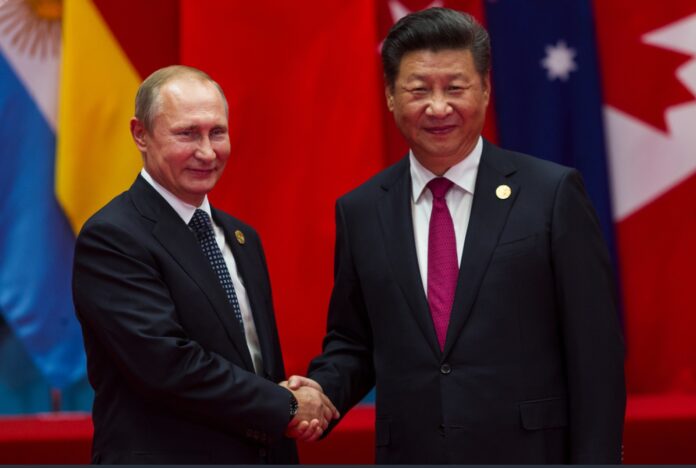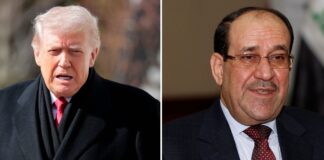Vladimir Putin will visit China on Thursday for the second time in less than a year, at the invitation of Chinese leader Xi Jinping. This is the latest indication of the two countries’ growing alignment at a time when global fault lines are becoming more pronounced as Russia advances in Ukraine and conflict devastates Gaza.
Less than a week after taking office again and prolonging his despotic rule until 2030 as the outcome of an election with no real opposition, Putin is scheduled to arrive in China.
According to Chinese official media, his visit, which is scheduled on May 16–17, is reminiscent of Xi’s own state visit to Moscow slightly more than a year ago, when he, like Putin, announced the unconventional beginning of a new term as president after revising the regulations governing the duration of office.
Their meeting takes place months before the US presidential elections and amid growing worldwide criticism of Washington for its backing of Israel’s Gaza War. The leaders will be able to debate how all of this can further their goal of undermining American influence and providing a substitute.
The two leaders’ visit coincides with what analysts describe as a loose but developing alliance between Iran and North Korea, two nations that openly oppose the United States. Western nations suspect that Pyongyang, whose economy is almost totally dependent on China, is providing Russia with military supplies. The US claims that Tehran, which is a significant actor in the Middle East conflict and is receiving economic support from China and Russia, is also in this situation.
Encouraged by the survival of his wartime economy and a big fresh push along critical areas of the Ukrainian front line, Putin will come for the two-day state visit. After just returning from a trip of Europe, Xi sees this visit as a chance to demonstrate that his loyalty to Putin has not affected his capacity to interact with the West.
Putin praised the “great prospects” of the two nations’ partnership and their combined efforts to “strengthen the sovereignty, protect the territorial integrity and security of our countries” in an interview with the Chinese state news agency Xinhua that was released on Wednesday ahead of his departure.
Putin said, “industry and high-tech, outer space and peaceful uses of nuclear energy, artificial intelligence, renewable energy and other innovative sectors” were the areas in which the leaders hoped to expand collaboration.
However, the outward display of the strong loyalty conceals a more difficult reality.
Beijing is coming under increasing pressure from Washington on its purported backing of Russia’s defense sector. In Europe, Xi had to deal with tense situations in France; he was only warmly received in Serbia and Hungary. Meanwhile, Russia, China’s main ally, is still isolated globally.
Xi has intensified his appeals for Europe and other nations to assist in preventing a “Cold War,” implying that they oppose what Beijing perceives as US attempts to control China.
However, the president is perceived as strengthening ties, especially when he visits Putin this week, to highlight the widening gap in the world that may exacerbate differences with the West, whose investment and technology, analysts say, China desperately needs.
The globe is becoming more dangerous because authoritarian powers are uniting more and more. China, Iran, and North Korea are supporting Russia in its aggressive campaign,” NATO Secretary Jens Stoltenberg cautioned last month.
This serves as a reminder that security is global, not regional. Furthermore, in order to maintain and safeguard transatlantic security, we must collaborate with our like-minded allies worldwide.
‘Grand strategy’
Xi’s visit with Putin this week is clouded by Western warnings of more extensive measures against his nation should it persist in supplying certain items to Russia. According to the US government, Russia’s defense industry is expanding thanks to dual-use exports.
Li Mingjiang, an associate professor of international relations at Nanyang Technological University in Singapore, stated that “the pressures are arguably bigger than they were in the past two years.” She was referring to the recent round of sanctions the US imposed on Chinese companies earlier this month, as well as the possibility of further sanctions from the EU.
China has stated that it keeps a careful eye on dual-use product shipments and disputes that its trade with Russia is anything more than regular bilateral communication. Last year, the two nations’ bilateral trade hit a record $240 billion.
On May 14, 2024, in Kiev, President of Ukraine Volodymyr Zelensky (L) welcomes US Secretary of State Antony Blinken.
On the question of whether Xi will try to utilize his time with Putin this week to push for an early resolution to the crisis, even astute observers of his evasive decision-making are split.
However, exports to Russia have decreased in March and April compared to the same months last year, according to China’s official trade data. This suggests Beijing may be taking precautions to guard against Western sanctions penetrating further into its financial and commercial sectors.
Recalibrating there, however, is unlikely to impede the two nations’ increasing collaboration in a number of sectors, since they regularly engage in military exercises and diplomatic visits. Analysts predict that it won’t alter Beijing’s position on Russia’s conflict either.
Manoj Kewalramani, head of Indo-Pacific studies at the Takshashila Institution research center in Bangalore, stated that “Russia is fundamental to China’s grand strategy.” He stated that although Beijing does not wish for hostilities to escalate, “there is a deep interest in making sure that Russia doesn’t lose the war.”
‘Force multipliers’
Analysts say that the Gaza conflict has created a chance for the two nations’ common objectives, and that it is also anticipated to be a topic of conversation between Xi and Putin.
During a joint press conference with his Chinese counterpart Wang Yi last month, Russian Foreign Minister Sergey Lavrov outlined these objectives in general terms. They include creating a “fair multipolar world order” free from American “hegemony and neo-colonial” practices and cooperating to “consolidate the nations of the Global South.”
Regarding Gaza, neither of the two major nations has spoken out against Hamas’ terror strike on Israel on October 7. Additionally, they have attacked both Israel and the US, joining the growing global outcry against Israel’s war, particularly in the Global South. According to the health ministry there, over 35,000 people have died in Gaza throughout the conflict, and the situation for mass humanitarian aid gets worse every week.
Although Russia has a degree of presence in the area and China has less real influence, Kewalramani in Bangalore stated that they “see each other as force multipliers” in reference to the similarities in how they are handling the issue.
He continued by saying that the crisis has affected China’s and Russia’s perceptions of their relations with those nations. This includes Iran, which joined the Shanghai Cooperation Organization and the BRICS international organizations—founded by Beijing and Moscow—last year.
“They regard Israel as a stand-in for the United States, while they see Iran as a component of the new system they are trying to establish. that, beginning October 7, has grown significantly sharper,” he stated.
‘Privately and quietly’
However, as the world grows more divided and Xi fortifies his ties with Putin and Russia, concerns are raised about where this will take the second-biggest economy in the world, both publicly and within China’s policy circles.
China, in spite of worries about its human rights record and aggression in the South China Sea and around Taiwan, is still seen throughout the West as an essential player and prospective collaborator on global issues like climate change, unlike internationally isolated Russia or Iran.
Shen Dingli, an international researcher residing in Shanghai, said, “Chinese like me feel shameful to receive Vladimir Putin, because his country defies the UN charter… (and is viewed by) 141 countries as an aggressor.” He claimed that although China “wants to use Russia” for its purposes, Russia is weakening China.
When a Weibo account in the name of well-known Russian ultranationalist theorist Alexander Dugin was created earlier this month, widespread mistrust and anxieties about Russia were on display in China.
Following a May 6 Franco-Chinese Business Council meeting in Paris, French President Emmanuel Macron and Chinese Leader Xi Jinping exchange handshakes.
Visitors to the unverified page on social media flocked to hear voices calling for a Ukrainian victory and highlighting historical tensions between the two nations. One user comment received hundreds of likes, calling on Moscow to return lands in the Russian Far East that were ceded to the Russian empire in the 19th century.
politicallines was unable to verify the authenticity of the account, despite gaining over 100,000 followers.
Even Xi and Putin’s close relationship is transactional in the face of shared tensions with the West, according to some observers, or at the very least, lacking trust within their broader government ranks due to historical mistrust stemming from border tensions that were only formally resolved in the early 2000s and China’s Cold War realignment with the US.
All of this is brought into sharp relief in the run-up to the US elections, the results of which might have a significant influence on US involvement with China and the course of the war in Ukraine; the reelection of former President Donald Trump could even be advantageous to Russia.
We are aware that some Chinese policy specialists would subtly and in private argue that notwithstanding recent geopolitical contestations and American pressure on China… Li stated in Singapore that China “could have avoided developing relationships with Russia to the extent that they are so close today while still maintaining somewhat better relations with the US and the West.”
But it seems that there isn’t much room for these kinds of questioning in Xi’s China.
Rather, this week’s meeting is expected to highlight the partnership’s strength and provide a chance for both parties to revisit a goal that Xi expressed to Putin during his official visit to Moscow a little over a year ago.




